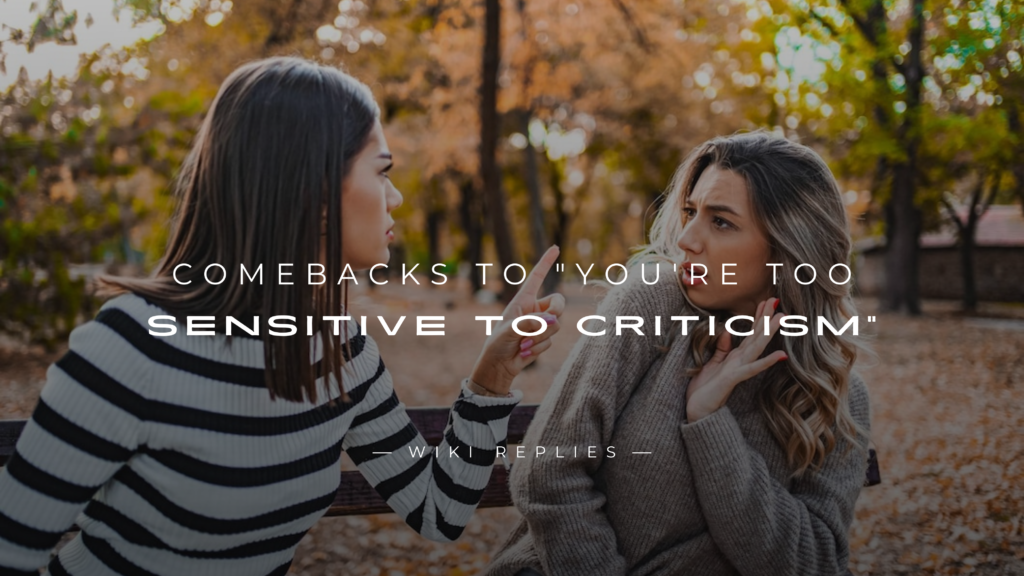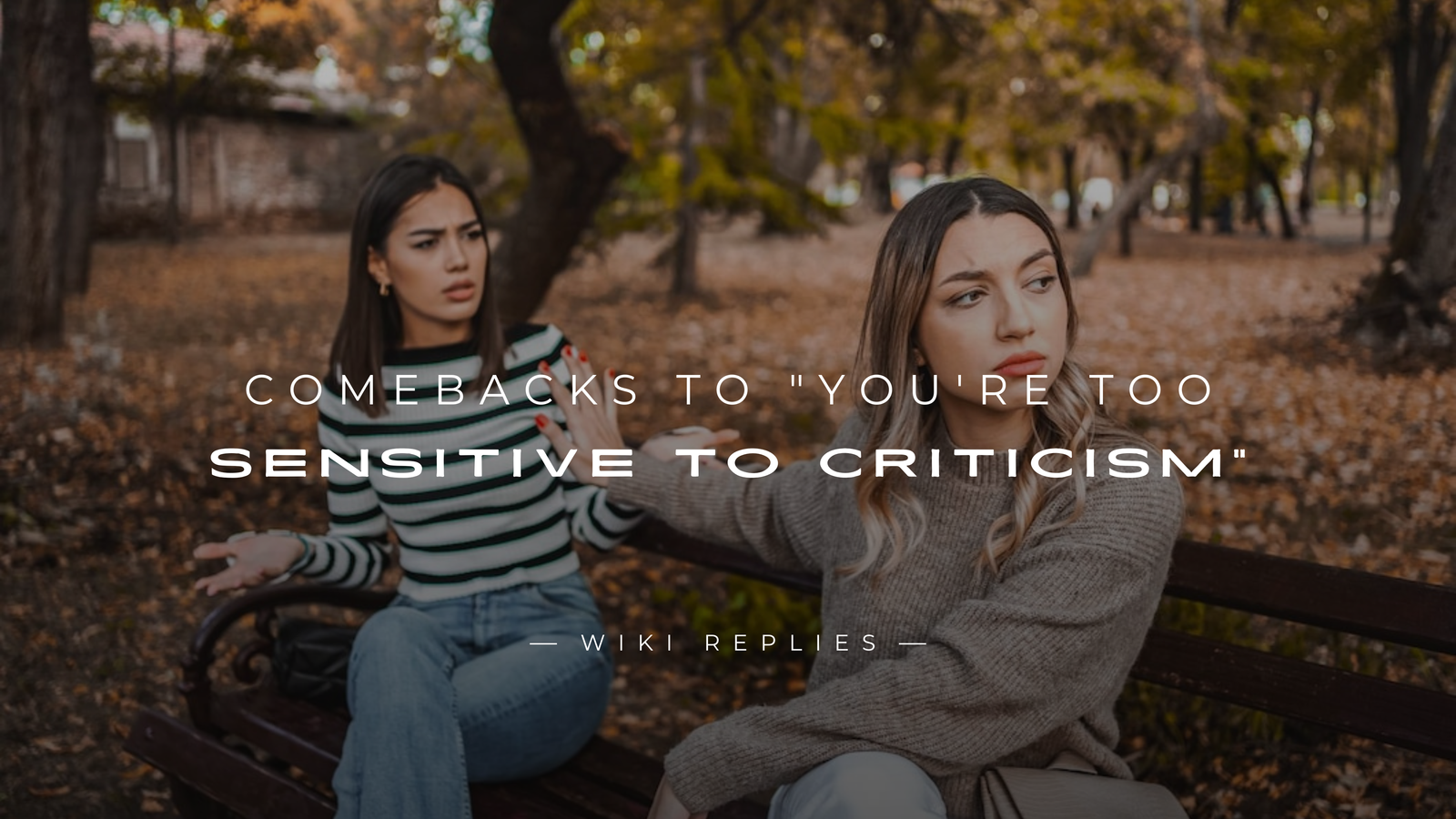Have you ever opened up about something that bothered you, only to hear someone respond with the phrase “You’re too sensitive to criticism”? It’s frustrating, right? That comment has a way of making you feel like your emotions are invalid or that you overreacted. The worst part is that it often ends the conversation before it even begins.
But here’s the truth. That phrase is not really about you. More often than not, it reflects the speaker’s discomfort with emotional honesty, accountability, or both. In this detailed guide, we’ll break down exactly what’s happening when someone calls you too sensitive to criticism, and more importantly, how to respond in a way that’s empowering, calm, and confident.
Let’s explore the psychology behind this phrase, understand why it’s so dismissive, and equip you with smart, assertive comebacks that help protect your emotional well-being and communication boundaries.

250+ Comebacks to “You’re Too Sensitive to Criticism”
Reflective Comebacks
- Maybe I just value respectful communication.
- I’m not against criticism, I’m for kindness.
- If something hits a nerve, maybe it’s worth understanding why.
- Sensitivity can be a strength, not a weakness.
- How we respond to words often says more about how they’re said.
- It’s not the feedback, it’s the delivery that matters.
- I reflect on what people say. That doesn’t mean I’m overreacting.
- I’ve learned to take things seriously when they don’t sit right.
- Noticing tone isn’t sensitivity. It’s awareness.
- Maybe we all need to be a bit more sensitive sometimes.
Witty Comebacks
- And you’re a shining example of subtlety, huh?
- Funny, I thought I was just allergic to rudeness.
- I’m only sensitive to nonsense, so yeah, maybe.
- It’s not sensitivity, it’s a radar for bad takes.
- I didn’t realize empathy was such a flaw.
- My bad, I forgot to turn off my emotional Wi-Fi.
- I’m not sensitive. I’m just fluent in passive aggression.
- Good thing you’re here to hand out personality labels.
- I must’ve missed the class where you became a psychologist.
- Great, now critique my emotions like a wine tasting.
Sarcastic Comebacks
- Oh no, I had the audacity to have feelings.
- You’re right, next time I’ll just nod like a robot.
- So sorry my humanity got in the way of your monologue.
- Wow, you’re really the expert on how others should feel.
- I’ll be sure to schedule my reaction better next time.
- Sensitivity? Tragic. How will I ever recover?
- Should I write that down in my book of fake flaws?
- Let me guess, next you’ll say I’m “too emotional”?
- What a crime, reacting to something offensive. Lock me up.
- Maybe I should just get a tattoo that says “Doormat” for your comfort.
Empathetic Deflections
- We all respond differently, and that’s okay.
- I hear you, but I also want to be heard.
- I’m not shutting down your opinion, just expressing mine.
- Criticism doesn’t bother me harshness does.
- I appreciate feedback when it’s shared with care.
- Maybe we’re both trying to be understood here.
- You may not mean harm, but it can still feel hurtful.
- I respect your view, I just wish it respected mine too.
- I’m open to critique, not to being talked down to.
- There’s a better way to say hard things.
Assertive Boundary-Setting
- I won’t apologize for wanting respectful conversations.
- You can give feedback without being dismissive.
- That might be your opinion, but I’m allowed to set boundaries.
- I can handle criticism. I just won’t accept disrespect.
- If you want to be heard, try speaking with more care.
- I don’t owe anyone silence just because they called it “feedback.”
- I’m drawing the line at how this is being said.
- You’re entitled to your opinion, not to belittle mine.
- This isn’t about sensitivity. It’s about self-respect.
- I expect more from someone who expects to be taken seriously.
Flipping the Script
- Maybe you’re not used to someone standing up for themselves.
- Interesting that my reaction is the issue, not your delivery.
- Could it be that you’re too sensitive to being questioned?
- Why is it always the listener’s fault when something lands wrong?
- I didn’t know “having standards” equals “being sensitive.”
- Do you always dismiss reactions, or just mine?
- If I called you out the same way, would you call that feedback too?
- Maybe you’re confusing dominance with communication.
- Funny how people who dish it out can’t take any back.
- You seem awfully sensitive to people not liking your tone.
Intellectual Comebacks
- Effective communication involves more than just saying what’s on your mind.
- Criticism isn’t valuable if it’s not constructive.
- Sensitivity isn’t the enemy of reason it enhances it.
- Emotional intelligence matters in giving and receiving feedback.
- The way criticism is delivered often shapes its impact.
- Feedback without mutual respect isn’t productive.
- Language isn’t neutral, and tone is part of communication.
- Defensiveness can go both ways.
- Maybe it’s not what was said, but how it was said.
- Dismissing someone’s feelings doesn’t make your point stronger.
Humorous Comebacks
- Oops, sorry my emotional firewall must’ve glitched.
- Hold on, let me go cry in a corner. Just kidding.
- I’ll add that to my “Reasons I Need Therapy” list.
- My sensitivity called. It says “Hi.”
- I’ll be sure to consult you next time I have a feeling.
- This just in: Human reacts to words.
- I guess I forgot to install the “tough skin” update.
- I’m sorry, did you mistake me for someone who asked?
- Trust me, if I were really sensitive, you’d know.
- Don’t worry, I only cry on weekends.
Petty/Fun Comebacks
- And you’re too boring to take seriously.
- Aww, is it hard when someone doesn’t laugh at your rudeness?
- The only thing I’m too sensitive to is bad energy.
- Coming from someone who thinks “just being honest” is a personality trait.
- If I wanted your opinion, I’d scroll past it.
- Sorry, I left my tolerance for nonsense at home.
- I could explain it to you, but you’d still miss the point.
- I’m sensitive to basic manners. Shocking, I know.
- If you were nicer, I’d care more about what you think.
- Your feedback’s been noted… and ignored.
Logical Comebacks
- There’s a difference between being honest and being unkind.
- Criticism is fine. Condescension isn’t.
- Respecting feelings isn’t the same as avoiding truth.
- Good feedback doesn’t need to feel like a punch.
- Sensitivity doesn’t invalidate the message, just challenges the method.
- If you want to be heard, consider how you’re speaking.
- Dismissing emotions doesn’t make your point more valid.
- Being aware of tone is part of effective communication.
- You can’t expect impact without considering delivery.
- Feelings aren’t flaws. They’re information.
Passive-Aggressive Comebacks
- Thanks for the unsolicited character analysis.
- Love how you disguise shade as advice.
- You must be so fun at family dinners.
- I’ll be sure to react more robotically next time.
- Not everyone can master the art of respectful feedback like you.
- It’s cute that you think that was helpful.
- I’m sure you didn’t mean to sound like that… again.
- You have a gift for turning conversations into insults.
- I’ll add “sensitivity” to my list, right under “tired of your tone.”
- Don’t worry. Your opinion has been safely filed under “unhelpful.”
Blunt Comebacks
- I’m not too sensitive. You’re just rude.
- I can take criticism. I just don’t take crap.
- That wasn’t feedback. That was you being a jerk.
- Talk to me with respect or don’t talk at all.
- You don’t get to say whatever you want and then blame me for reacting.
- It’s not sensitivity. It’s called having standards.
- I don’t owe you silence just because you’re calling it criticism.
- You’re not being honest. You’re being mean.
- Don’t confuse disrespect with directness.
- Stop hiding behind the word criticism. Own your tone.
Philosophical Comebacks
- If sensitivity is a flaw, then so is compassion.
- Maybe criticism without care says more about the critic than the one receiving it.
- Words don’t just carry meaning. They carry weight.
- Sensitivity is simply awareness turned inward.
- If we dismiss emotion, we lose half of what makes us human.
- Growth doesn’t require cruelty.
- A mind that’s open to learning is also open to feeling.
- Feedback should build, not break.
- A strong message doesn’t need a sharp edge.
- The wise speak with truth, but also with kindness.
Mirror Comebacks
- Funny, I was just about to say the same about you.
- You seem pretty sensitive to my response.
- Why is it okay for you to express, but not me?
- If I called you out like that, would you say I’m being honest or hostile?
- Seems like you’re more upset about my reaction than your words.
- So your delivery is fine, but my response is the problem?
- What if someone said that same thing to you, in the same tone?
- You’re allowed to criticize, but I’m not allowed to feel?
- Sounds like you expect others to accept what you wouldn’t.
- It’s always easier to blame the reaction than to own the impact.
Metaphorical Comebacks
- You can’t throw sharp stones and be surprised when someone bleeds.
- If you pour vinegar on a wound, don’t act shocked when it stings.
- Just because you call it seasoning doesn’t mean it’s not salt in the wound.
- Words can be weapons. You just prefer to call them tools.
- You handed me a brick and expected me to say thank you.
- I didn’t overreact. I just refused to let you keep throwing punches with words.
- Don’t step on someone’s toes and blame them for wincing.
- You gave fire, and now you’re surprised by the smoke.
- You hit send, not knowing you launched a grenade.
- You can’t stir the pot and act shocked when it spills.
Professional Comebacks
- In most workplaces, delivery matters as much as content.
- I’m open to feedback, not condescension.
- Effective communication includes tone and timing.
- Constructive feedback doesn’t feel like a personal attack.
- Emotional intelligence is a key part of leadership.
- If this were a performance review, your approach would be flagged.
- Being direct is fine. Being dismissive isn’t.
- In a professional setting, respect isn’t optional.
- Feedback should inspire improvement, not resistance.
- Productive conversations don’t start with defensiveness.
Gaslight-Resistant Comebacks
- Telling me I’m too sensitive is a way to avoid taking responsibility.
- Minimizing my feelings doesn’t make your tone okay.
- You don’t get to decide how your words land.
- This isn’t about being sensitive. It’s about you deflecting.
- Labeling me sensitive is easier than owning how you spoke.
- I’m not imagining things. I’m responding to your delivery.
- Calling it criticism doesn’t excuse being harsh.
- If you can’t say it without insulting me, it’s not valid feedback.
- I won’t let you rewrite this moment to make yourself look better.
- That sounds more like deflection than dialogue.
Comebacks Rooted in Emotional Intelligence
- I can take feedback when it comes from a place of care.
- Emotions are part of communication. Ignoring them isn’t strength.
- I want to understand your point, but the tone matters too.
- Strong relationships allow for honest and respectful feedback.
- I hear your message, but I also feel your delivery.
- Growth comes from listening, not just reacting.
- Empathy makes criticism easier to accept.
- I’m open to hearing you if we’re both open to learning.
- Let’s focus on solutions, not personal jabs.
- You can be honest without being hurtful.
Self-Aware Comebacks
- I know I feel things deeply. That doesn’t mean I’m wrong.
- I can be sensitive. It doesn’t mean your tone wasn’t harsh.
- I know how I react. I also know when something’s off.
- I’m working on being open to feedback, not abuse.
- I accept my emotions. You should accept your delivery.
- I’m learning to stand up for myself, even if I tremble.
- I’ve come a long way in knowing what I will and won’t accept.
- Yes, I felt it strongly. That’s why I’m bringing it up.
- I can be emotional and still have a point.
- My awareness of my reaction doesn’t excuse your behavior.
Role-Reversal Comebacks
- How would you respond if I said that to you?
- Would you still call it criticism if it were aimed at you?
- If I used that tone with you, would you feel attacked?
- Imagine someone said the same thing to someone you care about.
- Try hearing that back in your own voice. How does it sound?
- Would you teach someone else to give feedback like that?
- If the roles were reversed, would you call yourself too sensitive?
- Would you feel respected if I approached you that way?
- Think about how you’d take that message if it came from me.
- What if I criticized your delivery the way you criticize mine?
Cool Dismissals
- Okay.
- Noted.
- If you say so.
- Sure, let’s go with that.
- That’s a you problem.
- Sounds like something you’d say.
- Cool story.
- Appreciate the feedback. Really.
- You done?
- Anyway.
Hypothetical Comebacks
- What if someone spoke to you the way you just spoke to me?
- Would you still call it feedback if it came from someone else?
- If I said that to you, would it sit right?
- What if I said the same thing but added a smirk would that change it?
- Would this be your reaction if the roles were reversed?
- Imagine hearing that after a rough day how would you take it?
- If I delivered criticism like that, would you hear it or shut down?
- What would you tell your younger self if someone said that to them?
- If someone talked to your friend like that, how would you react?
- What would it take for you to hear feedback about your tone?
Personality Comebacks
- Some of us feel things. That’s not a flaw.
- I’d rather care too much than not at all.
- Sensitivity is part of being emotionally aware.
- My personality isn’t the problem. Your delivery might be.
- Some people are wired to notice tone. I’m one of them.
- I don’t hide behind detachment. I show up fully.
- If being thoughtful makes me sensitive, I’ll take it.
- Not everyone communicates like you. That doesn’t make them wrong.
- You might call it sensitivity. I call it awareness.
- I know myself. And I know disrespect when I hear it.
Culture-Aware Comebacks
- Calling someone too sensitive is kind of outdated, don’t you think?
- That sounds like something people say to avoid accountability.
- We’re not in the 90s. People expect more thoughtful communication now.
- Emotional intelligence isn’t optional anymore.
- Maybe this worked in your last circle, but it doesn’t fly here.
- Dismissing feelings used to be common. We’ve grown past that.
- This generation values communication with empathy.
- That mindset doesn’t really hold up in today’s world.
- Criticism without care isn’t progressive it’s lazy.
- You might want to update your approach for, you know, the current century.
One-Liner Zingers
- You’re confusing honesty with hostility.
- Not everyone’s numb, sorry.
- That’s cute. Try again.
- Respect hits harder than critique.
- Deliver better. Get better results.
- You sound more defensive than I do.
- You sure you’re not just mad I noticed?
- I’ve outgrown conversations like this.
- Take your critique and add empathy next time.
- It’s not my sensitivity. It’s your lack of tact.
Understanding What “You’re Too Sensitive to Criticism” Really Means
- Why Do People Say This?
This phrase typically comes up when someone doesn’t want to acknowledge how their words, tone, or behavior impacted you. Instead of reflecting on their delivery or message, they shift the attention to your emotional response. It’s a tactic that redirects the blame and tries to paint your emotions as the problem.
This might happen in the workplace, in personal relationships, or even during casual conversations. You try to express that something felt off or hurtful, and suddenly the focus isn’t on what was said to you. It’s on you being “too sensitive.”
It’s often used to silence you rather than support constructive dialogue. In many cases, it’s not that the person wants to help you improve. They just want you to stop reacting in ways that make them uncomfortable.
- What They Might Really Be Saying
When someone throws out that phrase, what they may really mean is one of the following:
- I don’t know how to handle emotional conversations
- I’m uncomfortable with accountability
- I thought I could say whatever I want without pushback
- I want to end this conversation quickly
These underlying meanings are rarely spoken aloud, but understanding them can help you detach from the guilt or shame the phrase tries to impose.
- How That Phrase Can Affect You Emotionally
Being told you’re too sensitive to criticism can hurt. It might make you feel ashamed for reacting honestly or cause you to second-guess your perception of the situation. Over time, hearing this kind of language repeatedly can lead to self-doubt and silence. You may start holding back your true thoughts and feelings to avoid being labeled as “emotional.”
But emotions are part of being human. Feeling upset, disappointed, or even angry about harsh words is not a flaw. It’s a natural reaction to unpleasant stimuli, especially when criticism is not given with care or respect.
The Difference Between Constructive Feedback and Harsh Criticism
- Not All Criticism Is Constructive
There’s a major difference between helpful feedback and mean-spirited criticism. Constructive feedback is offered with the intent to help you grow. It usually comes from a place of care and is communicated with respect.
On the other hand, criticism that makes you feel small, embarrassed, or attacked is not constructive. It might be vague, sarcastic, or laced with passive-aggressive tones. If you’re reacting emotionally to something, take a moment to assess whether the message was genuinely meant to help or if it was just someone venting their frustration or asserting control.
- Sensitivity Is Emotional Awareness, Not Weakness
Let’s debunk this myth right now. Being sensitive does not mean you are weak. In fact, sensitivity often indicates that you’re emotionally attuned, empathetic, and self-aware. These are traits that actually enhance communication, relationships, and leadership.
The real issue is not your sensitivity. It’s the lack of emotional intelligence on the part of the person who doesn’t know how to express feedback in a considerate and respectful way.
Why Your Comeback Matters
- You Are Setting Boundaries
Every time you respond with clarity and strength, you are teaching people how to treat you. Boundaries are about self-respect. If someone crosses that line by being rude or dismissive and then tries to blame you for reacting, your comeback is a way of saying, “No, this is not acceptable.”
- You’re Reclaiming Control of the Conversation
A well-phrased response takes the power away from the person trying to diminish your emotions. It puts you back in the driver’s seat and signals that you are confident, grounded, and not easily manipulated by dismissive language.
- Responding Well Reflects Inner Strength
It’s easy to blow up or shut down. It takes emotional maturity to respond thoughtfully. When you stay calm, assertive, and respectful, you walk away with your self-worth intact, regardless of how the other person reacts.
Smart and Effective Comebacks to “You’re Too Sensitive to Criticism”
Let’s dive into practical responses you can use in different situations.
- Assertive but Respectful Comebacks
“I’m not against feedback. I just value how it’s delivered.”
This comeback reframes the conversation. You’re not rejecting the idea of feedback. You’re asking for it to be done with care and respect.
“I’m allowed to feel something when someone speaks to me a certain way.”
This reminds them that emotional reactions are not only valid but expected in healthy human communication.
- Calm and Powerful Replies
“Maybe it’s not that I’m too sensitive. Maybe it’s that your words lacked empathy.”
A thoughtful way to shift the focus back onto their delivery without being confrontational.
“I respond to the energy I’m given. Respect usually gets respect in return.”
This statement subtly invites the other person to reflect on their tone and communication style.
- Lighthearted but Disarming Comebacks
“I must have forgotten to wear my emotional armor today.”
Humor can be a great tool when you want to defuse tension without giving away your power.
“If caring about how I’m treated makes me sensitive, then I’ll wear that label with pride.”
Own your sensitivity. Flip the label from insult to compliment.
When Silence Is the Best Comeback
- Recognizing Emotional Manipulation
If someone repeatedly uses this phrase to shut you down, it may be a form of gaslighting. Gaslighting involves making someone doubt their reality or feelings. If this is a pattern, silence or stepping away might be your strongest and safest move.
- Choosing Not to Engage Can Be Empowering
Sometimes the most powerful thing you can say is nothing. If the person clearly has no interest in respectful dialogue, you can choose to preserve your peace by walking away.
How to Build Emotional Resilience
- Understand Your Emotional Triggers
Knowing what kinds of comments affect you the most allows you to respond more intentionally. Awareness is the first step to managing emotional reactions effectively.
- Practice Self-Compassion
When someone accuses you of being too sensitive, respond with kindness to yourself first. Remind yourself that it’s okay to have emotions, to feel deeply, and to want respectful communication.
- Develop Clear Communication Skills
Using “I” statements helps express your feelings without sounding accusatory. For example, instead of saying “You’re being rude,” try “I feel dismissed when I’m told I’m too sensitive.”
Teaching Others How to Speak to You Respectfully
- Be Clear About What’s Acceptable
If someone’s way of speaking consistently hurts you, let them know. Say something like, “I’m happy to hear your feedback, but I’d appreciate it if we could talk about it calmly.”
- Lead by Example
Model respectful dialogue. When you show how to have emotionally intelligent conversations, you set a standard for the people around you.
How Society and Culture Shape Views on Sensitivity
- Cultural Expectations Affect Emotional Expression
In some cultures, showing emotion is seen as vulnerability. In others, it’s encouraged. Understanding this can help you recognize that being labeled “too sensitive” might be based on cultural norms, not truth.
- Gender Stereotypes and Sensitivity
Women are often told they are too emotional. Men are told to toughen up. These double standards reinforce harmful ideas about emotions. Recognizing this bias is essential when navigating criticism or emotional conversations.
Reframing Sensitivity as a Strength
- Empathy and Emotional Depth Are Valuable
Sensitive people often make great leaders, friends, and partners because they care deeply. Your ability to tune into emotions, both yours and others’, is not a weakness. It’s your superpower.
- Create Space for Healthy Communication
Next time someone gives you feedback, you can invite a healthier conversation by saying something like, “I want to hear your thoughts, but let’s make sure we’re both speaking with respect.”
Phrases to Avoid Saying in Return
- Don’t Escalate the Conflict
Avoid saying things like “You’re just mean” or “You always do this.” These statements turn the conversation into a battle and rarely lead to understanding.
- Don’t Apologize for Feeling
Saying “Sorry I’m sensitive” implies that your emotions are a flaw. Instead, try saying, “Thanks for your input, but I still feel strongly about this.”
Real-Life Comebacks in Different Situations
- In the Workplace
Coworker: “You take feedback way too personally.”
You: “I’m open to feedback, but tone and timing matter to me. Let’s work together on that.”
- With Friends or Family
Friend: “You always get offended.”
You: “I care about our relationship, so I speak up when something doesn’t feel right. That’s not offense. That’s honesty.”
- Online or Social Media
Commenter: “Triggered much?”
You: “Not triggered. Just choosing not to accept disrespect disguised as opinion.”
Conclusion
No one gets to decide how you should feel, especially when they’re hiding behind the excuse of “criticism.” With these 250+ sassy comebacks, you now have the perfect words to flip the script and reclaim your power without losing your cool. Remember, being sensitive isn’t a flaw, it’s a sign of awareness and strength. Keep standing up for yourself with confidence and flair. And if you ever hear the insult “You’re not pretty enough,” don’t miss these 250+ Brilliant Comebacks to “You’re Not Pretty Enough” to shut that down too.
FAQS
Q. What should I do when someone says I’m too sensitive in public?
Stay calm. You can say, “I’m simply expressing how I feel, and I think we can have this conversation more respectfully later.” This protects your dignity and diffuses public embarrassment.
Q. Is it bad to take things personally sometimes?
Not at all. Taking things personally often means you care about how you’re treated. It’s only a problem if it prevents you from seeing the situation clearly. Reflection helps balance emotional reactions.
Q. How can I stop overreacting to criticism?
Take a breath before responding. Ask yourself whether the criticism was constructive. Then choose to respond rather than react. Practice and emotional awareness make this easier over time.
Q. Why do some people hate being called out?
Because it threatens their self-image. They might feel guilt or defensiveness and project that discomfort back onto you. This is about their emotional limits, not your behavior.
Q. Can sensitivity actually help in communication?
Yes. Sensitivity helps you read the room, notice unspoken cues, and respond with empathy. These are all key elements of great communication and emotional intelligence.










